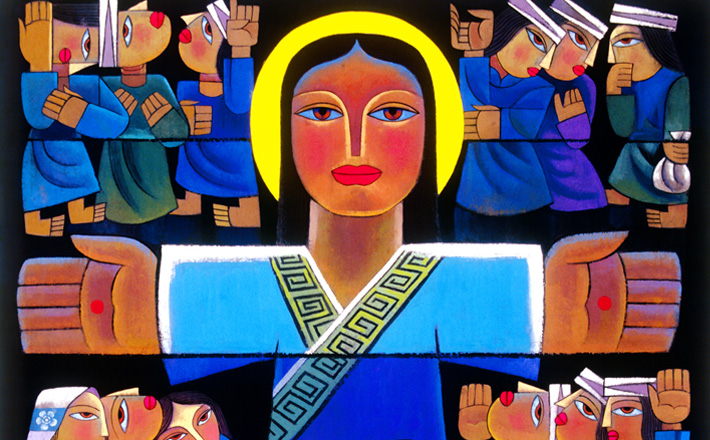Commentary on Acts 5:27-32
Some people already realized that joining the apostles was risky business (Acts 5:13).
This episode at Acts 5:27–32 marks the second time that some religious leaders and Sadducees arrested, detained, and interrogated the apostles for preaching the resurrection of Jesus. Previously, Peter and John were imprisoned because the same religious authorities were “much annoyed” at their preaching Jesus’ resurrection (4:1-4). This second time they are motivated by “jealousy” (v.17). The first time, the council eventually released the apostles. However, this time “an angel of the Lord” discharges them (v.19). And when brought before the Council, they again declare their resolve to privilege the voice of God over human authority (anthropoi) (5:29; cf. 4:19).
Following the Apostle Paul’s lead, nineteenth century black preaching women declared that they would obey God rather than mortal men. Many religious institutions continue to prohibit women from preaching and being ordained in churches. Independent black churches arose in response to the racism of white denominations. Yet many black churches practice sexism against black women called to preach the Gospel. Women generally are still less likely to be hired or promoted as senior pastors despite their increased numbers in seminaries. However, women are expected to submit to oppressive religious authorities; and some do. A mature female student and minister related that the women in her church approached her about convening a bible study at her home. The women were in pain, she said, and needed a safe space to experience the life-giving power of God. This female minister approached the pastor for his permission! The pastor first agreed and then changed his mind. She yielded to his authority as to when, what and whom she could teach in her own home! Do we fear men above the God who called us? Following God is risky business. Sometimes following God’s voice versus human authority means risking institutional approval and community. Responding to God’s voice may result in oppression and alienation. Nineteenth-century preaching women envisioned the world as their pulpit. Maybe some of us need to escape some of the prisons in which human authorities have placed us.
Refusing to be silenced, the apostles talked back to and/or sassed the authorities who unjustly and unnecessarily brutalize and detain them: #ResurrectedLivesMatter; #Jesus’LifeMatters; #Apostles’LivesMatter. The Sadducees and their allies denied that God resurrected Jesus, insisting that #AllLivesMatter. Thus, oppressed people deserve no special intervention.
God sides with the oppressed
With God, Black lives matter; Muslim lives matter; Jewish lives matter; refugee lives matter; poor lives matter; women’s lives matter; incarcerated lives matter; the most oppressed among us matter. God’s people should be agents of reversal. We are to embody good news to the poor, imprisoned, and those oppressed because of their religious affiliation, culture, gender, race, class, or sexual orientation. The religious entities, authorities and communities to whom we often submit do not always side with the oppressed or with justice. Authoritative communities and institutions sometimes allow themselves to be hijacked by their own biases, dogmas, racism, sexism, classism, and prosperity gospels. We stifle God’s voice. Absent intentional self-reflection, internal and external critique, religious institutions and peoples always risk becoming more and more like the oppressors and less and less able to see and hear God speak in new and life-giving ways. Instead, we justify death and dying.
The lynched body does not have the final word
The apostles’ ministry of healing and preaching intervenes in the lives of the oppressed. Peter and the apostles persist, maintaining that God raised the Jesus of Nazareth whom “you” lynched by hanging on a tree (Acts 5:30). God sided with the colonized Nazarene that religious authorities lynched (2:22). But God did more than resuscitate that same Jesus. In an act of great reversal, God promoted Jesus from a disgraced death to a position of authority at God’s right hand; God invested Jesus with the power to forgive sins, including the lynching of Jesus. Forgiveness involves both acknowledgment and reversal of the collective sin of a nation and its impact. When sins are committed by a nation, the sins must be acknowledged if reconciliation is to occur — even if those currently in power are not the ones who constructed the noose and convened the lynching.
The apostles claimed that they were witnesses not just of the lynching of Jesus but to God’s exaltation of Jesus, Acts 5:30. These events were not something they read about but that they experienced. New experiences/events that we witness should impact what is already written down and can alter in some way our prior knowledge. We search the scriptures to support what we think we already know about God and to affirm, too often, our oppressive ways toward others — others who think, teach, live, and look differently from ourselves. As a result of the disgrace and the exaltation that the apostles experienced as witnesses to Jesus’ death and resurrection, they could approach life, vocation, and humanity through a different lens or perspective. They see, if darkly, through the lens of the oppressed, devalued, and lynched other.
Lynched bodies, police brutality and mass activism
The apostles refused to stop talking about how God resurrected the lynched body of Jesus. The only reason the Temple police did not violently arrest the apostles was because they feared the mass protests. They fear that their brutality would be captured by the masses and result in their mobilization and retaliation (Acts 5:26). If it were not for the willingness of the people, the masses, to disrupt injustice, to protest, the apostles would have been the fatal victims of police brutality. When injustice and oppression permeate religious, social, and political systems, nothing short of mass activism will transform them. Mangled, lynched bodies sometimes resurrect our consciousness and lead to the dismantling of unjust systems. Preach it; Live it: God raised Jesus!


April 3, 2016